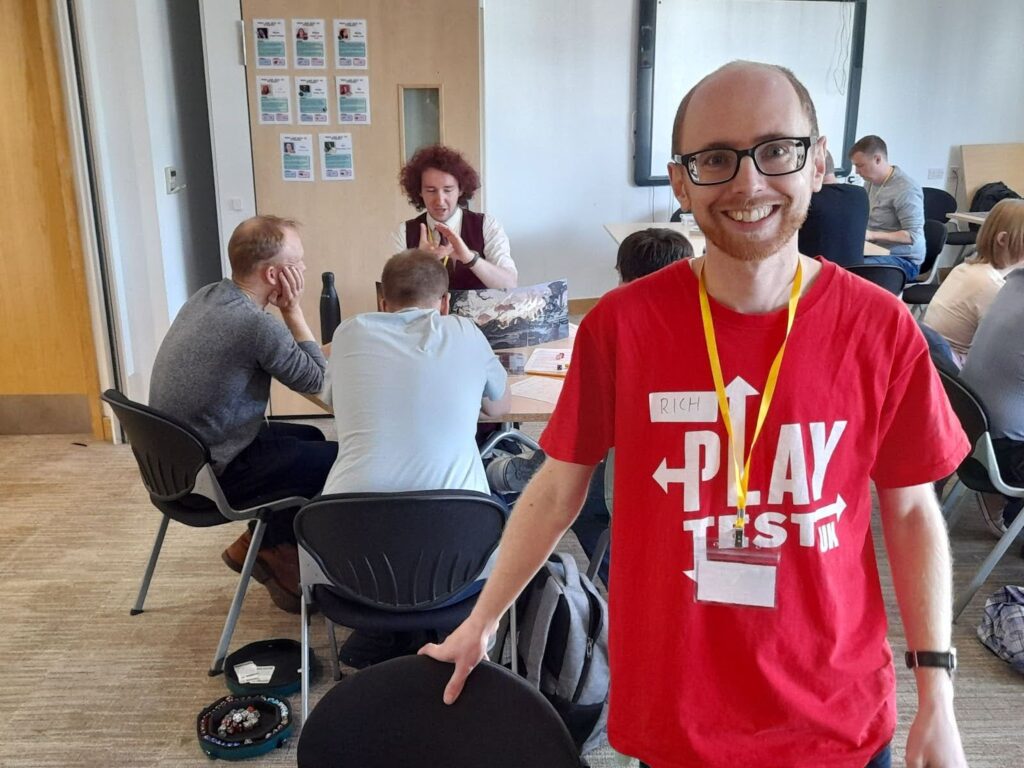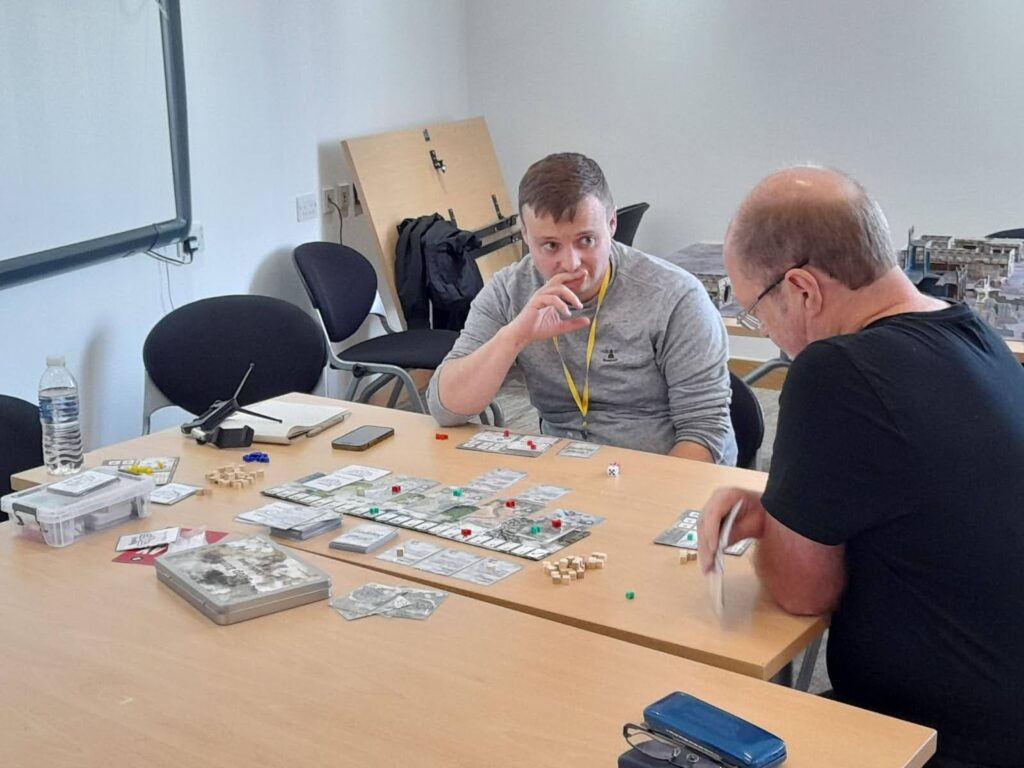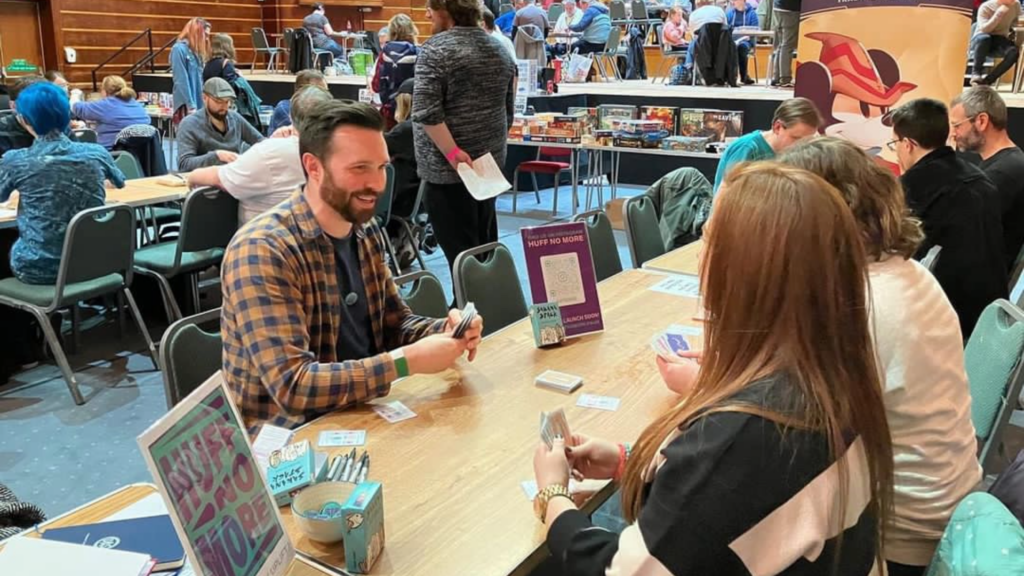
This week I’m joined by Richard, the indiedid, to talk about all things playtesting. We dive deep into the world to work out what really makes it tick. You can find Richard’s blog here if you want to read more of his wonderful insight.
Joe: Let’s start with introductions – Richard, tell me a little about yourself and your life in board games!
Richard: That’s a tough question because board games – and playtesting in particular – have been such a big part of my life since 2016. Those years have included a variety of cities, jobs, games and gaming groups. I spent last year backpacking which, though light on gaming, was great for broadening my horizons. I moved to Newcastle in April and spent my first couple of weeks visiting as many gaming groups as possible. I’ve sort of settled into a routine now: board games on Fridays; a Warhammer: Black Crusade campaign on Wednesdays, and playtesting at The Bridge Hotel on the first Tuesday of the month.
I think the unifying theme in all this is my interest in people. Gaming helps me make new friend.
I think the unifying theme in all this is my interest in people. Gaming helps me make new friends; every group and session is different. I worked for several years as a teacher and the profession has some similarities to game design. A teacher enjoys a certain amount of creative freedom but has to deliver on finite objectives in a finite space of time. I like to say that the key to a good lesson is the same as that of a good game: you have to ensure the students/players have ownership of the experience.
Joe: And as this post will feature on both our blogs, I should probably do an intro too.
I’ve been designing board games for about a year now, and playing games for much longer. Board games are incredibly powerful artefacts for bringing people together and creating stories. That’s why I love them so much.
I was also a teacher for quite a long while, but found my love of all things playful working for a charity called ATE that runs residential summer camps. These camps allowed me the scope to develop playful approaches to community building, some of which were through games. We’d build entire one-off immersive evening activities that incorporated aspects of board games, storytelling, game shows, and adventures.
Any space that gives me the opportunity to be creative and playful is where I want to be, which sits me firmly in the board game design world!
This post, I think, is going to be about playtesting. You’re involved with the Playtest UK group – can you tell me a bit about them?
Richard: I’m with you on the bringing people together and creating stories! Playtest UK is an organisation which has been “connecting the game design community since 2009.” It started in London as a small group of designers and playtesters who realised they could achieve more by working together than as individuals. They would meet regularly, playtest each other’s games and generally have a good time – I believe early venues were pubs. This model continues to this day, and our group here in Newcastle is a case in point. A group might playtest a specific game dozens of times during its development.
At some point, Playtest UK started running dedicated playtest zones at wider tabletop events. These events, in addition to getting more playtesting in, have increased the visibility of designers, prototypes and the hobby itself. The best-known one is held annually at the UK Games Expo in Birmingham – this year it hosted approximately 115 designers from around the world. At these events, Playtest UK presents itself as a united organisation with many red-shirted staff, but I’d say this is an exception to the norm. For the most part, it is a loose collection of friendly groups meeting up informally.
Joe: It’s quite an incredible organisation, and I’m lucky to have our local group in Newcastle Upon Tyne. The more I’ve been involved with the group, the deeper my understanding of playtesting has become.
Initially, I understood it to be about creating more games, and the opportunity for game designers to regularly and robustly test their games ahead of releasing them out into the world.
I assume that’s probably what a lot of people see it as. Would that be a fair assessment?
Richard: Yes, I’d say that’s fair, though with the caveat that releasing the games into the world is optional. I think the game design community has begun to move away from its publication-focused approach towards a more artistic one. Playtesting is also about sharing ideas: pouring everyone’s creativity and experience into the project. My favourite playtests are those in which the feedback session runs for longer than the game’s actual playtime. On several occasions, I have playtested another designer’s game and given a piece of feedback which they felt wouldn’t quite fit. I’ve gone home thinking about my idea, and it’s grown into a game project in its own right.
I think the game design community has begun to move away from its publication-focused approach towards a more artistic one.
I’m not alone in taking inspiration from other designers. A recent example from the Newcastle group is a project which was intended to fit into a wider role-playing game as a sort of module or minigame. The designer struggled to articulate the rules for it because it was so wrapped up in the wider rules and aims of the main game. In the discussion that followed, another designer suggested a simple series of mechanics for a game which, though not very thematic, would fit the bill as a starting point. One month later, and after appropriate conversations with the former designer, they brought a full version of that game to the pub and we playtested it. I think everyone benefited from this.
Joe: Ideation and creativity in a playtest community can be quite wonderful, can’t it!
Let’s explore the idea of game design as an artistic endeavour for a moment. This way of thinking about games has grown on me over time, the idea that it’s the process and love of the creation that is beautiful and that a “published game” isn’t the end goal.
The sheer act of creation can feel quite incredible and I think it can also be liberating for designers to stop worrying about getting the art out into the world and swim in the waters of creative expression instead.
Richard: Games (analogue or digital) are an unusual art form in that the audience are also the main characters, or key decision-makers. This makes them fundamentally collaborative, just as the process of designing them is a collaboration between designer and playtester. Designing games feels to me like exploration: the initial set of mechanics and ideas have the potential to be adapted in an infinite number of different ways. With so many possible end points from a single start, I find it very hard to actually finish a game. I used to think this was a problem but I’ve fallen in love with it, and you can follow this journey on my blog.
Since starting my blog, my interests have diversified, and this is largely thanks to the people I’ve met at game conventions and playtesting events. If I was really focused on publication, I might have missed those people. In this digital age, it’s very easy to experiment with different artistic media and I like to think tabletop games sit at a sort of junction. There are overlaps with the worlds of role-playing games, cinema and visual arts to name a few. The series of tabletop games based on the Dune franchise are just one example of games providing an interesting perspective on an alternative world.
Joe: Design as exploration is a brilliant way of putting it. I’m with you all the way; the journey is so much more brilliant than the view from the top.
A few weeks ago, you were organising the Playtest UK event space at the North East Tabletop Expo. Whilst I was playtesting there, I realised something else that playtesting offers. Something not for the designers but for the playtesters.
As the day progressed, we had many people come and go. They’d try out a game or two, and then move on to the rest of the expo. But for a few people, the playtest space became the place they stayed for several hours; well beyond the time when they would have played all the games.
I have some thoughts about this, but I wonder if that’s your experience too and what you think?
Richard: It helped that, besides the trade hall, we were one of the main things going on at the event. People come to cons to have experiences they can’t necessarily have at their local gaming group, and a playtesting session could be one of them. In addition, I think we provided a sort of safe space: it was relaxing and the games were already set up. Each designer was working hard to host their game and ensure people felt welcome. There were two types of attendee who really benefited from this: families and those who came alone (I’d like to be able to include neurodiversity here too, but since I have no solid facts about that we could leave it for another time).

The experience of playtesting a prototype is very different to that of playing a published game, especially if the designer is present. It creates a dialogue between game and player and allows the latter to contribute rather than just consume. I think we had one playtester who played a game with its designer on the Saturday, came back on Sunday to find their feedback had already been acted on, then playtested it again. You might be able to tell us more about that?
Joe: Yeah, Paul. We’d clearly created a space where he felt safe; it’s where he spent almost all of his time on both days. I think in the playtesting space, the playtester has such a wonderfully important and clearly defined role. They’re there to play and enjoy themselves, but also we as designers truly care about their experience. There’s an unwritten framework, which allows those players to be honest and share their thoughts.
There’s an unwritten framework, which allows those players to be honest and share their thoughts.
I wonder if, for some players, that might not be the experience they get in their day-to-day lives. But playtesting allows them to confidently step into a different sort of role or space. That must feel incredibly welcoming and special, maybe even unique for them to experience, so I can see why playtesters like Paul come back.
There’s more to it, though, than just putting out some games to playtest. You were working really hard to help potential playtesters find a game to play and to integrate them into the space. Can you tell us a little more about that?
Richard: I hadn’t really thought about it, so I’m glad you asked. I think it’s actually related to my strategy a few years ago when I was helping some friends out with their stand at a game convention (they were selling something). I tried not to launch straight in with the agreed “pitch” when people approached the stand. Some would come straight to me with questions, while others preferred to take their time reading and looking at the products. I tried to listen and judge each interaction on its own terms.
At the playtest zone this year, I would usually open with something like “Welcome to the nerdiest part of the convention” and show them the Blood on the Clocktower and Warhammer 40K events which were happening in our vicinity. If they then asked what my role was, I’d tell them about the zone; otherwise, I’d let them explore at their leisure. Later, I would introduce the zone designer by designer rather than game by game and invite people to have a look around. In hindsight, I was actually relying on the designers to pitch not just their projects but the whole zone to the people they spoke to.
Joe: You did really well; you could tell how supported the testers were and how comfortable they felt in the space.
OK, let’s round this out. We’ve got this thing, playtesting, and on the surface, it does one thing, but when you look a little deeper, there’s a whole other world not far beneath the surface, and that’s really incredible.
If you could sum it up, what brings you back to the playtesting table again and again?
Richard: Knowing that I’ll have a brand new experience every time. This applies even if I’ve playtested the project before, because the new playtesters and new ideas I meet get me thinking in new ways. It’s a great way to socialise and learn how other people “tick”. It’s also a welcome excuse to go to the pub.
Thanks to Richard for joining me on the blog this week, you can find his website and blog here. And make sure you subscribe to the WhatIf? blog using the form below!


